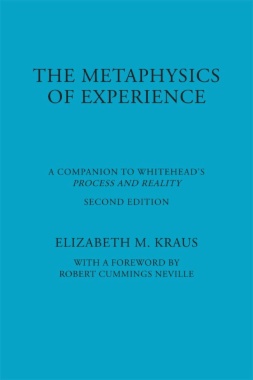The Metaphysics of Experience styles itself as "a Sherpa guide to Process and Reality, whose function is to assist the serious reader in grasping the meaning of the text and to prevent falls into misinterpretation." Although originally published in 1925, Process and Reality has perhaps even more relevance to the contemporary scene in physics, biology, psychology, and the social sciences than it had in the mid-twenties. Hence its internal difficulty, its quasi-inaccessibility, is all the more tragic, since, unlike most metaphysical endeavors, it is capable of interpreting and unifying theories in the above sciences in terms of an organic world view, instead of selecting one theory as the paradigm and reducing all others to it. Because Alfred North Whitehead is so crucial to modern philosophy, The Metaphysics of Experience plays an important role in making Process and Reality accessible to a wider readership.
- Cover�������������������������������
- The Metaphysics of Experience�������������������������������������������������������������������������������������������������������
- Title�������������������������������
- Copyright�������������������������������������������
- Dedication����������������������������������������������
- CONTENTS����������������������������������������
- Acknowledgments�������������������������������������������������������������
- Note����������������������������
- Abbreviations�������������������������������������������������������
- Foreword����������������������������������������
- Preface�������������������������������������
- 1. Process Philosophy and Its Problems����������������������������������������������������������������������������������������������������������������������������������
- I • The Nature of Process Philosophy����������������������������������������������������������������������������������������������������������������������������
- II • The Language Problem�������������������������������������������������������������������������������������������
- III • The Language of Feeling�������������������������������������������������������������������������������������������������������
- 2. Science and the Modern World as a Romantic Version of Process and Reality����������������������������������������������������������������������������������������������������������������������������������������������������������������������������������������������������������������������������������������������������
- I • The Rhythms of Growth�������������������������������������������������������������������������������������������
- II • Scientific Materialism and the Fallacy of Simple Location����������������������������������������������������������������������������������������������������������������������������������������������������������������������������������������������������������
- III • Prehension as the Basis of Induction����������������������������������������������������������������������������������������������������������������������������������������������
- IV • The Actual Occasion as a Space–Time Quantum
- V • The Literary Experience�������������������������������������������������������������������������������������������������
- VI • Eternal Objects����������������������������������������������������������������������������
- VII • Creativity����������������������������������������������������������������
- VIII • God����������������������������������������������
- 3. The Speculative Scheme (PR, Part I)����������������������������������������������������������������������������������������������������������������������������������
- I • The Nature of Speculative Philosophy����������������������������������������������������������������������������������������������������������������������������������������
- II • The Categoreal Scheme and Derivative Notions�������������������������������������������������������������������������������������������������������������������������������������������������������������������
- 4. Discussions and Applications (PR, Part II)�������������������������������������������������������������������������������������������������������������������������������������������������������
- I • Fact and Form�������������������������������������������������������������������
- II • The Extensive Continuum����������������������������������������������������������������������������������������������������
- III • Order, Society, Organisms, and Environment����������������������������������������������������������������������������������������������������������������������������������������������������������������
- IV • The Modal Theory of Perception�������������������������������������������������������������������������������������������������������������������������
- a. Perception in the Mode of Causal Efficacy����������������������������������������������������������������������������������������������������������������������������������������������������
- b. Perception in the Mode of Presentational Immediacy�������������������������������������������������������������������������������������������������������������������������������������������������������������������������������
- c. Perception in the Mode of Symbolic Reference�������������������������������������������������������������������������������������������������������������������������������������������������������������
- V • Prolegomenon to a Theory of Judgment: Propositions����������������������������������������������������������������������������������������������������������������������������������������������������������������������������������
- VI • The Theory of Judgment�������������������������������������������������������������������������������������������������
- VII • Process: An Overview����������������������������������������������������������������������������������������������
- 5. The Structure of a Concrescence (PR, Part III)
- I • The Nature of Genetic Analysis����������������������������������������������������������������������������������������������������������������������
- II • The Nature of Feelings in General����������������������������������������������������������������������������������������������������������������������������������
- III • The Primary Feelings
- IV • Propositions and Feelings����������������������������������������������������������������������������������������������������������
- V • Comparative Feelings����������������������������������������������������������������������������������������
- 6. The Theory of Extension (PR, Part IV)����������������������������������������������������������������������������������������������������������������������������������������
- I • Coordinate Division�������������������������������������������������������������������������������������
- II • Extensive Connection�������������������������������������������������������������������������������������������
- III • Flat Loci
- IV • Strains����������������������������������������������������
- V • Measurement�������������������������������������������������������������
- 7. God and the World (PR, Part V)�������������������������������������������������������������������������������������������������������������������
- I • God the Redeemer����������������������������������������������������������������������������
- II • Concluding Meditations�������������������������������������������������������������������������������������������������
- Bibliography����������������������������������������������������
- Indices�������������������������������������

